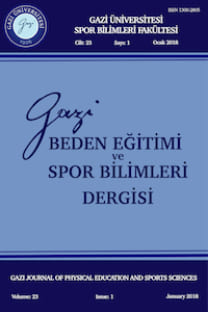A MİLLİ BOKS TAKIMI İLE MÜSABIK İKİ FARKLI BOKS TAKIMININ SEÇİLMİŞ FİZİKSEL VE FİZYOLOJİK ÖZELLİKLERİNİN KARŞILAŞTIRILMASI
Bu çalışmanın amacı; A Milli Boks takımında yer alan ve ülkemizi uluslararası yarışmalarda temsil eden boksörlerin seçilmiş fiziksel ve fizyolojik değerlerini tespit etmek ve farklı iki grupla karşılaştırmaktır. Çalışmada A Milli Boks takımı ve diğer gurupların boyu metreyle, ağırlığı dijital elektronik tartıyla, istirahat kalp atımları steteskop ile, tansiyonu steteskop tansiyon aletiyle, vücut yağ yüzdesi skinfold kaliper ile, esnekliği esneklik otur ve eriş sehpasıyla, reaksiyon zamanını newtest 1000 reaksiyon zaman ölçeriyle, pençe kuvvetini el dinamometresiyle, anaerobik gücü dikey sıçrama ve Aerobik gücü 12 dk.’lık yürü- koş (Cooper) testleri kullanılarak ölçümler ve her takımın değişkenleri arasında karşılaştırma yapıldı.Araştırmamız bulgularına göre; Anova testiyle yapılan ölçümlerle elde edilen her bir fiziksel ve fizyolojik değişken α=0,05 anlamlılık seviyesinde istatistiki olarak değerlendirildi. Levene Varyans Homojenlik testi sonucuna göre yaş ve sese karşı Reaksiyon Zamanı değişkenlerinin (α= 0,05) seviyesinde homojen olmadığına, Kuruskall Wallis testi sonucuna göre Yaş değişkeninde istatistiki anlamda (α=0,05 ) seviyesinde bir farkın bulunmamasına rağmen, sese karşı Reaksiyon Zamanı ortalamalarında istatistiki anlamda (α=0,05 ) seviyesinde fark bulundu. Gurupların Anova testi sonuçlarına göre Işığa karşı Reaksiyon Zamanlarında ve aerobik güç ortalamalarında istatistiki anlamda (α=0,05 ) seviyesinde fark bulundu. Geriye kalan fiziksel ve fizyolojik değişkenler “ Boy, Ağırlık, Vücut Yağ Yüzdesi, Esneklik, Dinlenik Kalp Atım Sayısı, Tansiyon, Pençe Kuvveti ve Anaerobik Güç” ortalamaları arasında istatistiki anlamda (α=0,05 ) seviyesinde fark bulunmadı. Sonuç olarak, araştırmaya katılan tüm gruplar arasında yapılan karşılaştırmada A Milli Boks Takımı ile diğer seçilmiş iki farklı grup arasında fiziksel ve fizyolojik özellikler açısından anlamlı bir fark bulunamamıştır. (P>0.05)
Anahtar Kelimeler:
Boks Milli Tak›m›, Boks ve fiziksel parametreler, Boks ve fizyolojik parametreler.
COMPARISON OF THE SELECTED PHYSICAL AND PHYSIOLOGICAL CHARACTERISTICS OF THE TURKISH NATIONAL BOXING TEAM MEMBERS WITH TWO DIFFERENT BOXING TEAMS
The purpose of this study was to compare each others by measuring selected physical and physiological parameters of the Turkish National Boxing Team with the two different boxing teams In this study, to compare the variables with each other all the measurements were taken as follows; Height was measured by using meter, weight was measured by using electronic scales, resting hearth rate was measured by using stethescope, blood presure was measured by using stethescope and sphygmomanometer, percent body fat was measured by using scinfold caliper, flexibility was measured by using sit and reach test, reaction time was measured by using Newtest 1000 Reaction Timer, grip strength was measured by using Hand Tensiometer, anaerobic power was measured by using vertical jump, aerobic power was measured by using 12 min. (cooper) walk-run test. Statistical analysis were done by using Anova. All physical and physiological variables were statistically tested at ( α =0,05 ) significance level. As a resalt of the Levene Test there was significant difference at ( α =0,05 ) level between age and reaction time- audio variables, there was no significant difference at ( α =0,05 ) level in age with the other grops and there was significant difference at ( α =0,05 ) level in reaction time-audio variables at the end of the Kruscall Wallis test and as a result of the Anova test there were significant difference at ( α =0,05 ) level between reaction time- light variables and aerobic power between the National Boxing Team members with the other different teams. There was not a significant difference at ( α =0,05 ) level between the remains of “Age, Weight, Percent Body Fat, Flexibility, Resting Heart Rate, Blood Pressure, Hand Grip and Anaerobic Power” between the National Boxing Team members with the other boxing groups. There was no significant difference in between three groups in terms of selected physiological and physical characteristics. (α=0,05 )
Keywords:
Boxing National Team, Boxing and Physical Parameters, . Boxing and Physiological Parameters,
___
- 1. AIBA.: (1986), “ Fifty Years of Internat›onal Amateur Boxing Association”, Published by AIBA.
- 2. ASTRAND, P.O. and ROAHL, K.(a) : (1986), “Textbook of Work Physiology”, Physiology Basis of Exercise. “3rd. Ed”., N.Y.: Mc Graw-Hill Book Campany, p.:193.
- 3. BUCHER, C.A.: (1983), “Foundations of Physical Education and Sports”. The C.V. Mosby Campany. St. Louis.p.p.:15-21.
- 4. BURKE, E.J.: (1978), “ Physiology and Components of Physical Fitness in the Analysis of Human Performans”. In E.j. Burke (ed.), Toward an Understanding Human Performans Ithace Movement Pub. , p.p.:213-218.
- 5. CAVALA, C., (1983) : “ Prevention in Boxing” The Journal of Sports Medicine and Physical Fittnes. Vol.: 23. N.:4.
- ISSN: 1300-2805
- Yayın Aralığı: Yılda 4 Sayı
- Başlangıç: 1996
- Yayıncı: Gazi Üniversitesi
Sayıdaki Diğer Makaleler
Feyzullah Aydaş, Alper Uğraş, Seyfi Savaş
CİMNASTİKTE ÖNE SALTO BECERİSİNİN ÖĞRETİMİNDE SÖZEL VE GÖRSEL DÖNÜTLERİN BAŞARIYA ETKİSİ
Özlem MUTLUBAŞ KAYA, Gıyaseddin DEMİRHAN, Zeki DURSUN
PROFESYONEL ve AMATÖR FUTBOLCULARIN BAŞARI MOTİVASYONU FARKLILIKLARI ve SPORTİF TECRÜBE İLE İLİŞKİSİ
BEDEN EĞİTİMİ VE SPOR ÖĞRENİMİ VEREN YÜKSEKÖĞRETİM KURUMLARINDA ÖRGÜT KÜLTÜRÜ
